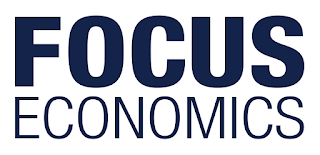A string of weaker economic data suggests that the Eurozone economy decelerated at the start of 2018, following a robust spell of growth last year. While GDP data for the first quarter is still outstanding, monthly indicators have been soft, with economic sentiment falling throughout the quarter, and industrial production dropping in January and February. That said, the tailwinds of last year’s solid growth remain largely in place, and the slowdown is likely to be moderate thanks to a tightening labor market and ultra-accommodative monetary policy. FocusEconomics analysts expect GDP to have expanded a seasonally-adjusted 0.5% over the previous quarter in Q1, down from Q4’s 0.7% expansion. Preliminary GDP data released by national statistical institutes revealed that growth waned in Austria, Belgium and France. In France, a weak performance by the external sector and a sharp slowdown in corporate investment dented momentum in the quarter. While subdued domestic activity likely sparked the slowdown in Belgium, the details behind the release are still outstanding. Although Austria’s economy decelerated somewhat, growth was still strong by historical standards, bolstered by both domestic demand and the external sector. Meanwhile, Spain expanded at a solid rate, clocking a third consecutive quarter of steady growth. First-quarter GDP data for the remaining economies is still outstanding. The political landscape in the common currency bloc remains uncertain and convoluted, casting a shadow on its future. Italy is in a state of political deadlock after the March election yielded a fragmented congress, and it remains to be seen when or if a government will be formed. Moreover, it seems unlikely that a new government will have the political willpower or ability to push tough economic reforms, which could limit the economy to growing at a subdued rate. In Slovenia, early elections were called for 3 June on 14 April, following Prime Minister Miro Cerar’s resignation. Early polls place the center-left List of Marjan Sarec (LMS) in the lead; this is the first time LMS is running in a national vote. However, uncertainty is high, and the race is close, making it difficult to call. Meanwhile, Greece presented its post-bailout vision to Eurozone members on 27 April as it enters the final stretch of its third bailout program. The program is set to expire in August, and the country is eager to acquire debt relief and take control over its economic policy; Regional outlook moderates
3 May 2018 however, there are fears among Euro officials that Greece could backslide on reforms or fiscal consolidation once the bailout ends. Negotiations over an exit package are expected to continue in the coming weeks.
The Eurozone economy appears to have hit a speed bump in the first quarter, with monthly indicators pointing to a deceleration in activity after a robust spell of growth in 2017. Industrial production plummeted in February, and economic sentiment dropped in March. In addition, the composite PMI fell to an over one-year low in March and hovered there in April, suggesting that the soft patch may have leaked over into Q2. On the political front, wrangling over the 2021–2027 EU budget is set to begin, and the European Commission will present its draft proposal on 2 May. The budget will likely contain some cuts to spending programs and larger national contributions, in part due to the UK’s exit from the bloc, which is set for March 2019. Soft incoming data led FocusEconomics panelists to downgrade their view of the Eurozone economy this month, following six consecutive upgrades. Growth is seen remaining healthy in 2018, supported by an improving labor market, accommodative monetary policy and firm investment. That said, an uncertain political scene and global trade tensions could dent confidence, while exports are expected to lose steam due to a strong euro. The panel now sees the Eurozone economy growing 2.3% this year, down 0.1 percentage points from last month’s forecast. In 2019, GDP is forecast to grow 2.0%. Harmonized inflation rose to 1.3% in March (February: 1.1%). Inflation has failed to pick up substantially despite an ultra-accommodative stance by the ECB. On 26 April, the Bank made no changes to its monetary policy. Our panel sees inflation averaging 1.5% in 2018 and 1.6% in 2019.
From Focus Economics
From Focus Economics


